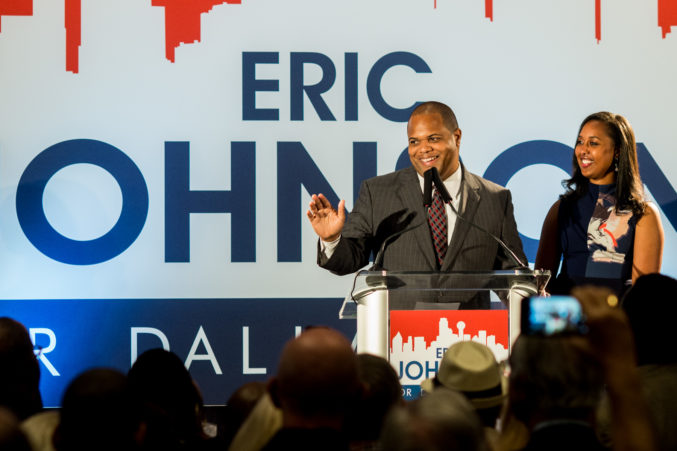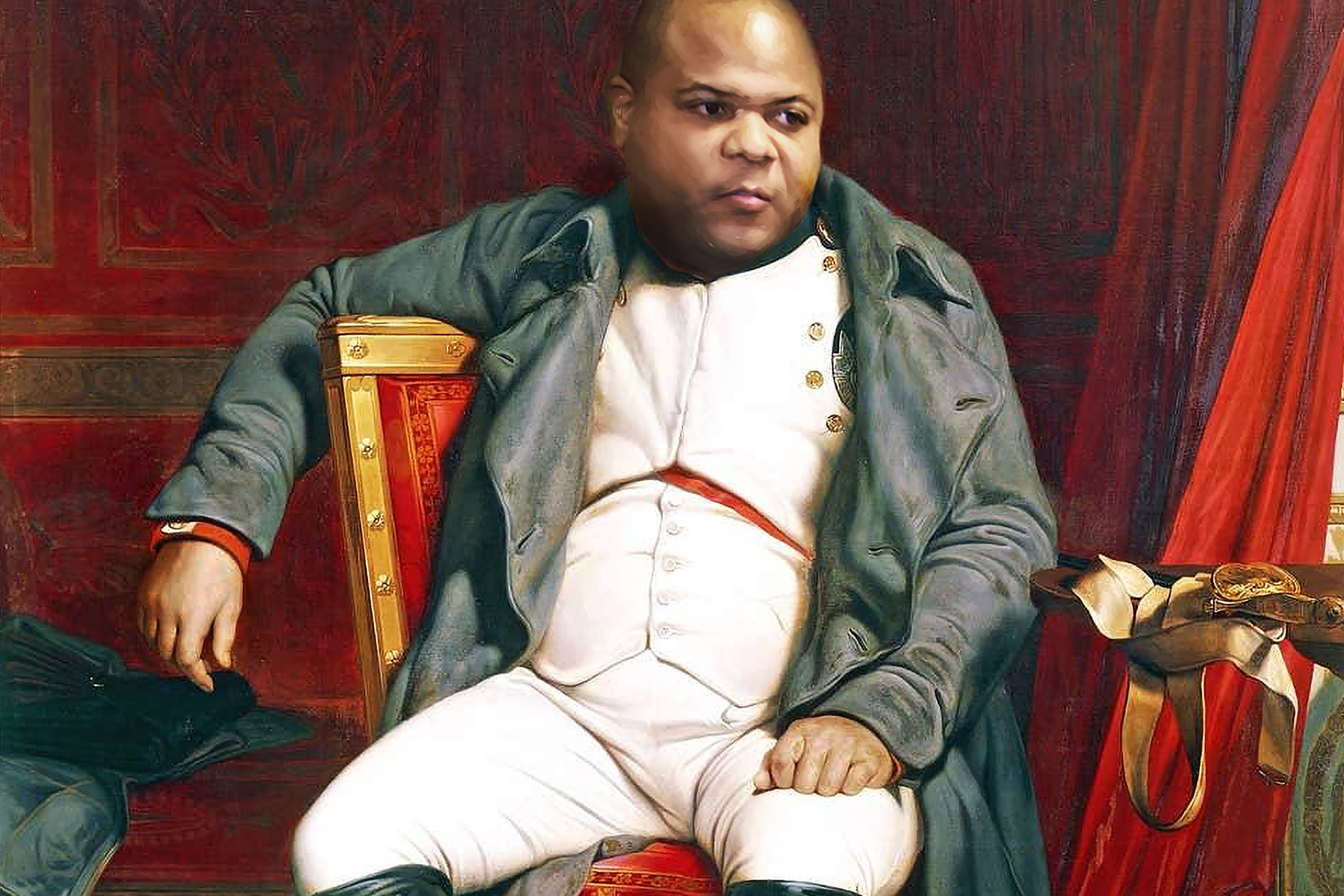A year has passed since Dallas saw a crowded, fiercely contested mayoral race that ended in a runoff victory for former State Rep. Eric Johnson. In that year, we’ve learned a great deal about the mayor, especially as the crucible of the coronavirus pandemic heated up City Hall. The portrait that has come into focus isn’t flattering.
The outline: Johnson ran on a promise to restore civility to local government, but his leadership style has been anything but friendly. City officials, political consultants, and City Hall watchers describe Johnson as aloof or difficult to track down, a man who comes across as both absent and authoritarian. He seems to prefer to communicate with the city and his colleagues through memos and proclamations. He wields the limited powers of the mayor’s office through interpersonal politics. Prove you are loyal, and you will be rewarded with face time and appointments; cross him, and you’ll be met with threats and obstruction.
Now, the details: Johnson’s style was on display early in his term, even if it was difficult to recognize without knowing the ins and outs of City Hall’s operations. To start, you have to understand that in Dallas’ council-manager form of government, the mayor gets one vote, just like the 14 other council members. His power exceeds theirs only in that he sets the council agenda and appoints members to boards and committees.
Unlike the strong mayor systems in most large American cities, in which the mayor manages city staff, in Dallas, those duties fall to the city manager, who is like the city’s CEO. The mayor is more like the chair of a board of directors. And so it was curious when Johnson took an abnormally long time to establish council committees. He says he was being judicious and deliberate. But some council members claim he was testing loyalty, setting the stage for how he would use procedural moves to leverage the mayor’s limited powers.
When committee chairs were finally chosen, two people were left without any chair or vice chair appointments: Councilman Adam Bazaldua (District 7, South Dallas, Fair Park) and Councilwoman Paula Blackmon (District 9, Lakewood, East Dallas). Bazaldua says he wasn’t surprised. He was a supporter of Scott Griggs, Johnson’s opponent in the runoff. It was more difficult to understand what disqualified Blackmon, who has worked on the staffs of former mayors Tom Leppert and Mike Rawlings, DISD superintendent Mike Miles, and state representatives Dale Tillery and Harryette Ehrhardt.
Prove you are loyal, and you will be rewarded with face time and appointments; cross him, and you’ll be met with threats and obstruction.
Council members who were awarded with appointments found they could just as easily lose them. There’s a story floating around City Hall that when Councilman Chad West (District 1, North Oak Cliff), the mayor’s chair of the Housing and Homelessness Solutions Committee, cast a vote the mayor didn’t agree with, Johnson sent West a text calling him an “ungrateful bastard.” West would neither confirm nor deny that he got such a text. Councilman Lee Kleinman (District 11, North Dallas) opened his email in January to find a memo from Johnson’s office dissolving the ad hoc Administrative Affairs Committee he chaired, and the news came on the eve of important deliberations over hiring a city attorney. Also in January, Johnson re-created an ad hoc Legislative Affairs Committee that Kleinman once chaired under Rawlings, but Johnson appointed himself as chair, leaving Kleinman off the committee. It was difficult not to see the moves as retaliation, perhaps over Kleinman’s communications with state legislators about cleaning up an illegal dump in southern Dallas nicknamed Shingle Mountain or a proposal to reopen the procedure for how committee chairs are appointed. “When I put that on my administrative ad hoc committee, that’s when my committee got dissolved,” Kleinman says.
Then came the COVID-19 crisis. Trouble started early, when Johnson inexplicably inserted himself into a spat between Gov. Greg Abbott, a Republican, and Dallas County Judge Clay Jenkins, a Democrat who has spearheaded the local response to the pandemic. Abbott threatened to take away a pop-up hospital at the Kay Bailey Hutchison Convention Center, claiming the county didn’t plan to use it. That wasn’t true, but the governor never called the judge to talk it over. Neither did Johnson, who fired off his own statement, saying he was “stunned and deeply disappointed” about “Dallas County’s position on the pop-up hospital.” Johnson’s eagerness to throw brickbats at a county official he should have been working with arm in arm showed a lack of maturity, to put it mildly.
The mayor issued more statements and memos that raised eyebrows. In April, in a memo circulated to council members, Johnson revealed that he had asked the then interim city attorney and the Texas Attorney General’s office for an opinion about the mayor’s authority during state or local disaster declarations. “Several of you have asked about the legal authority and decision-making process for enacting emergency regulations,” Johnson wrote to the Council. “I have had some questions as well.”
Johnson’s questions were warranted. There is a considerable gray area between state law and the city code in terms of determining the powers of public officials during a state of disaster. And with Judge Jenkins and the county’s public health department running the show on the COVID-19 response, that left Johnson without a clear leadership role.
But rather than wait for the city attorney’s opinion, Johnson circulated a letter from Attorney General Ken Paxton stating that Texas law gave the mayor authority over the city manager during disaster declarations. It was an odd move to invite Paxton into the city’s affairs before hearing from the city attorney.
Then, just eight days later, Johnson about-faced after hearing back from the city attorney. The mayor’s office said it would not release the city attorney’s opinion, which it says is confidential, but after receiving it, Johnson issued another memo saying he was stepping back to allow the city manager to lead the city’s COVID-19 response. Not much had changed regarding the COVID-19 situation during that week, but there was a big change at City Hall. Between Paxton’s letter and the city attorney’s opinion, the Council had finally voted to give interim City Attorney Chris Caso a permanent job with a 13-2 vote. Johnson cast one of the two dissenting votes.
Whatever their intent, Johnson’s clumsy memos made the ordeal look like a power grab, leading to speculation on the Council that the mayor was using the pandemic to silence his critics and limit the Council’s ability to do business at City Hall (or from their living rooms, as the case may be). This speculation was fueled by the mayor’s earlier move, at the city manager’s request, to suspend all committee meetings. Without the committees, council members were left without their primary mechanism for introducing items to be taken up by the full City Council.

It all came to a head in mid-March, when Bazaldua attempted to bring an ordinance before the Council that would help some of the most vulnerable in our city during the COVID-19 outbreak. He approached Johnson’s office with an idea for an emergency ordinance that would set a 60-day moratorium on evictions. Bazaldua never heard back from the mayor.
That was not unusual. Since Johnson was sworn into office last year, Bazaldua has struggled to get his attention. He set up an appointment not long after Johnson’s term began, and it was postponed, then canceled, then set and postponed again. After four months of waiting for a face-to-face with Johnson, Bazaldua gave up.
Now, unable to get a response to his idea about evictions, Bazaldua borrowed the mayor’s own strategy. On March 28, the Saturday before the City Council’s next meeting, he issued a memo, signed by four of his colleagues, asking Johnson to place on the agenda a discussion of the eviction moratorium. Johnson responded two days later with his own memo, stating that he would refer the evictions proposal to one of two COVID-19 ad hoc committees he’d created. In the memo, Johnson also announced that he would eliminate two of the COVID-19 ad hoc committee co-chairs. Councilwoman Blackmon and Councilwoman Cara Mendelsohn (District 12, Far North Dallas) lost their positions. Blackmon had signed Bazaldua’s eviction memo. Mendelsohn says she isn’t sure why she was removed.
There were good reasons not to rush Bazaldua’s ordinance to the Council. It presented complicated legal ramifications that needed to be ironed out. But Bazaldua was impatient to see the Council adopt the ordinance in time for April rent, and he says he was frustrated that he couldn’t use the weeks leading up to the April 1 council meeting to refine the proposal because he had no idea if the mayor would even consider taking up the issue.
Tristan Hallman, the mayor’s chief of policy and communications, says he doesn’t remember speaking with Bazaldua during this time but says it was possible they talked briefly about how to stop evictions. “I honestly don’t remember,” Hallman says. “There may have been some passing, fleeting conversation about it. Remember, it was mid-March. There was a lot going on. It was pretty crazy.”
Regardless, the mayor’s displeasure with Bazaldua was on full display at the council meeting. Exasperated with his inability to get his ordinance on the Council agenda, Bazaldua attempted to introduce a motion that would reopen the Council’s rules of procedure and thereby revisit the agenda-setting process, but Johnson swooped in to squash the effort. The fact that the mayor stopped the vote isn’t as important as how he did it.
Using arcane parliamentary procedure, Johnson forced the Council to a vote not on Bazaldua’s motion but on whether it was within the power of the mayor to decide if the city manager can place an item on the agenda that the mayor believes relates to policy (the mayor’s purview), not city operations (the city manager’s purview). The mayor won the vote 8-7 and with it made a sweeping assertion of mayoral power that appeared to challenge the very functioning of Dallas’ 14-1 council district system, minimizing the decisions of the city manager and his staff.
The conflict didn’t end there. A month later, when the ordinance made it back to the full Council, Johnson used his time to speak before the vote to remind his colleagues how upset he was with the way the idea for the ordinance was originally raised.
He gave his colleagues a speech on the nature of leadership; offered an explanation of the many problems he saw in Bazaldua’s “overly simplistic” original ordinance; explained his reasons for entering public service; read “into the record” the names of the four council members who had signed Bazaldua’s original memo; congratulated himself on 10 years of legislative service; and praised the remaining chairs of his two COVID-19 ad hoc committees for their “temperament and leadership” as “model committee chairs.”
“I took longer than most Dallas mayors to structure committees and to select committee chairs because committees, especially when led by judicious and thoughtful chairs, allow us to legislate more efficiently and effectively,” the mayor pontificated. “And after almost a year as your mayor, I now know I didn’t get every single committee assignment right. And when the time comes, I’ll reassess the structure and leadership of all of our committees.”
Even though the Council voted unanimously to approve the ordinance, the mood after the speech was chilly. They had received the message.
“I felt like I was getting scolded on national TV,” Blackmon says. “And I was like, because I signed a memo to put something on and then we didn’t understand how the process was going to come about? I felt that renters were honestly scared about what was going to happen this next month, and I’m trying to do my part and just say, ‘We’re going to work with you.’ But there’s definitely a naughty and nice list, and I’ve maintained my streak of being on the naughty list, I guess.”
It appears that about half of the Council has been put on the naughty list. Most of them won’t talk about it on record because talking about the naughty list is a good way to solidify your spot on it. The situation has taken a toll on the culture at City Hall. It has made it more difficult for council members to know where their colleagues stand on a given issue because everyone’s volatile relationship with the mayor may come into play.
“It’s trust,” Blackmon says. “And if it breaks down, you get very guarded in comments when you talk to certain people, and then you start wondering, ‘Well, what’s it going to be? What’s going to entice somebody to switch?’ It is very interesting when you have that reward and punishment. That’s how the state Legislature works. I’ve worked there, and I’m not going to fault anybody, because that’s sometimes how you’ve been brought up in politics. But it doesn’t work well when you come back to Dallas.”
“I felt like I was getting scolded on national TV.
Council member Paula Blackmon
Kleinman, who is serving his last stint on the Council before hitting his term limit, says he won’t let his guard down. “I want to preserve our council-manager form of government,” he says. “And when I see that being eroded, I get concerned. We’re not a strong mayor system, and I think every mayor comes to that realization at some point in their career.”
It is difficult to get a handle on where exactly Johnson sees himself in all this. Despite more than a year of requests from various D Magazine staffers, he has never granted an interview, preferring to rely on Hallman to serve as his voice. Hallman defends perceptions of the mayor’s occasional elusiveness, pointing out that he has two young children and a very busy schedule as mayor of the country’s ninth-largest city. Johnson is also a partner at a law firm specializing in municipal finance (a position he took after his election that itself has generated controversy over conflicts of interest and focus).
What we are left with is optics: formal press conferences, carefully prepared statements, and local television interviews. It is ironic that a mayor who appears to meticulously manage his public image, shielding himself from criticism and projecting authority with press releases and podiums, comes across as insecure and thin-skinned.
As Kleinman notes, Johnson is not the first Dallas mayor who has stumbled out of the gate. Laura Miller was flummoxed to learn that city staff only began to take her seriously after she won an election to a second term. Rawlings lurched through a contentious first few years in office before realizing that his power lay in using the mayoral office as a bully pulpit to preach civic unity and leverage spinoff public-private partnerships. Leppert carved out time in his calendar to make the rounds of the Council’s offices, sitting down for informal chats with his colleagues to learn their priorities and establish relationships that would make it easier to form voting blocs.
Johnson differs from some of his mayoral predecessors in that he has limited management experience. But he still has time to learn some of their lessons. “I said to him, you may be the smartest person in the room, but you are not the only smart person in the room,” Kleinman says. “You should listen to what some other people have as ideas.”
It was, after all, Bazaldua’s vision and tenacity that got the eviction moratorium before the Council. Bazaldua tried to hand the mayor an easy win, and the mayor thanked him for it with a public beating. That may be a sign of arrogance, or it may be an indication of a lack of self-awareness. But it is something Johnson will need to overcome if he hopes to make anything out of his time as Dallas mayor—even if what he hopes to make is a run at higher office.






